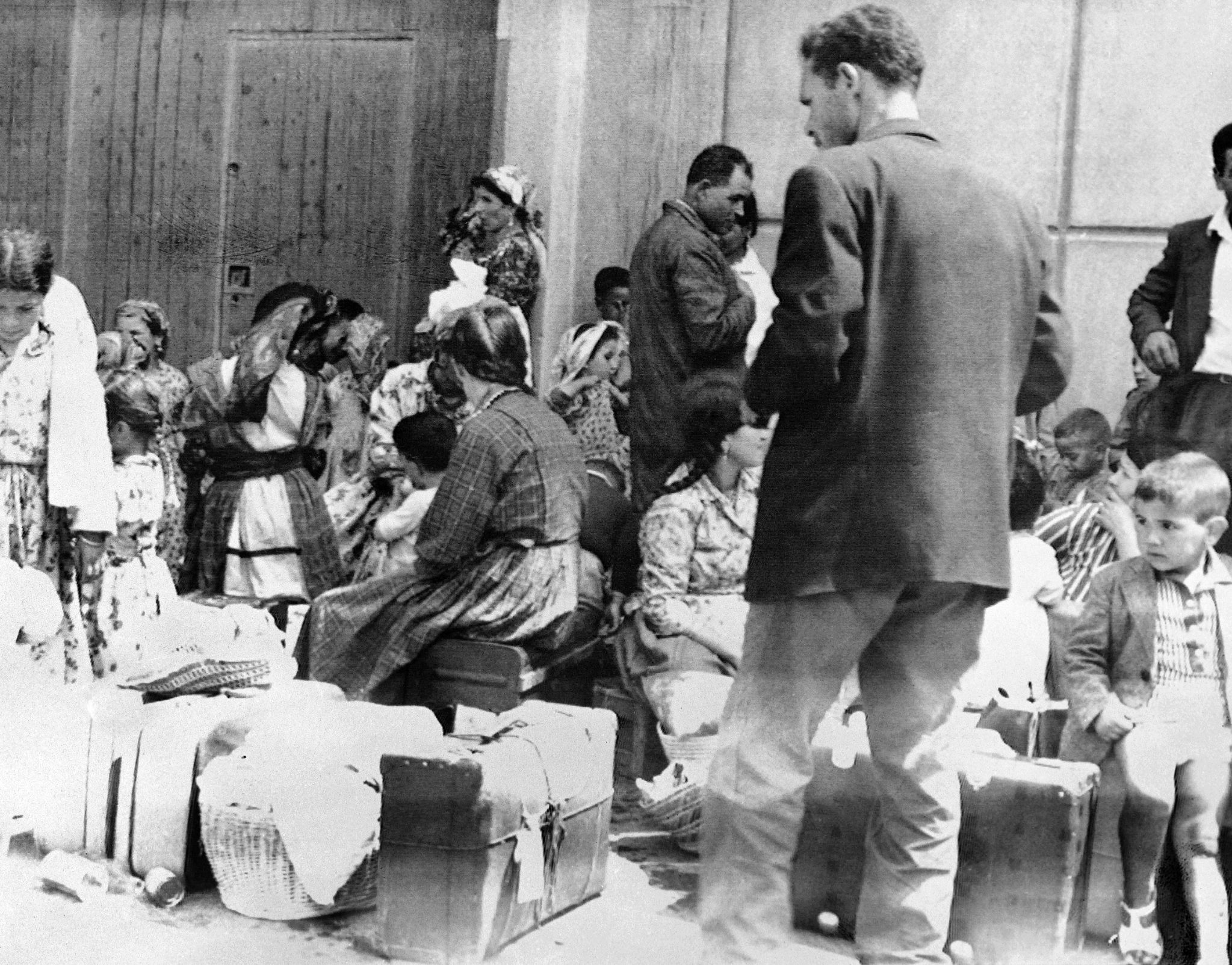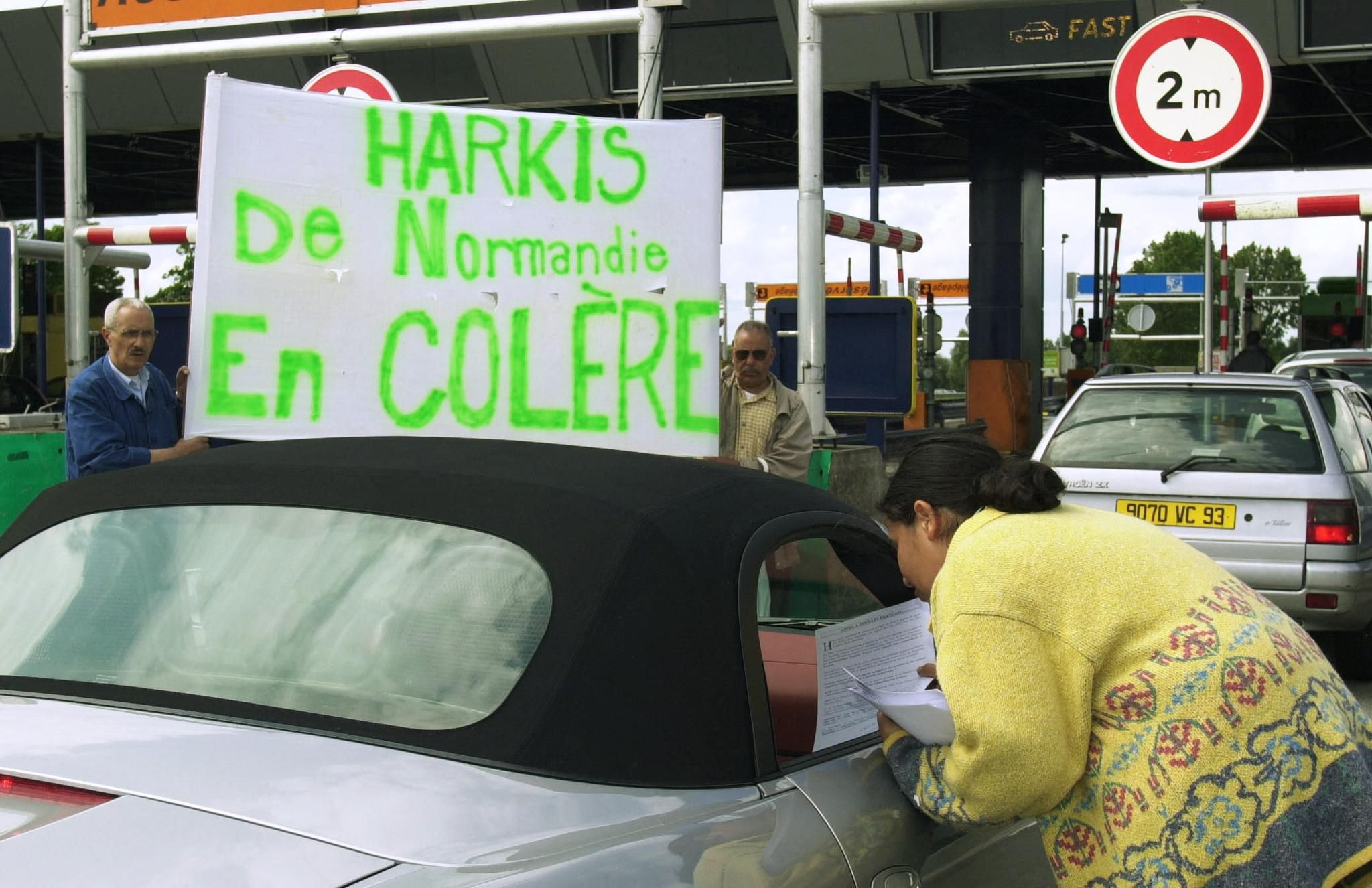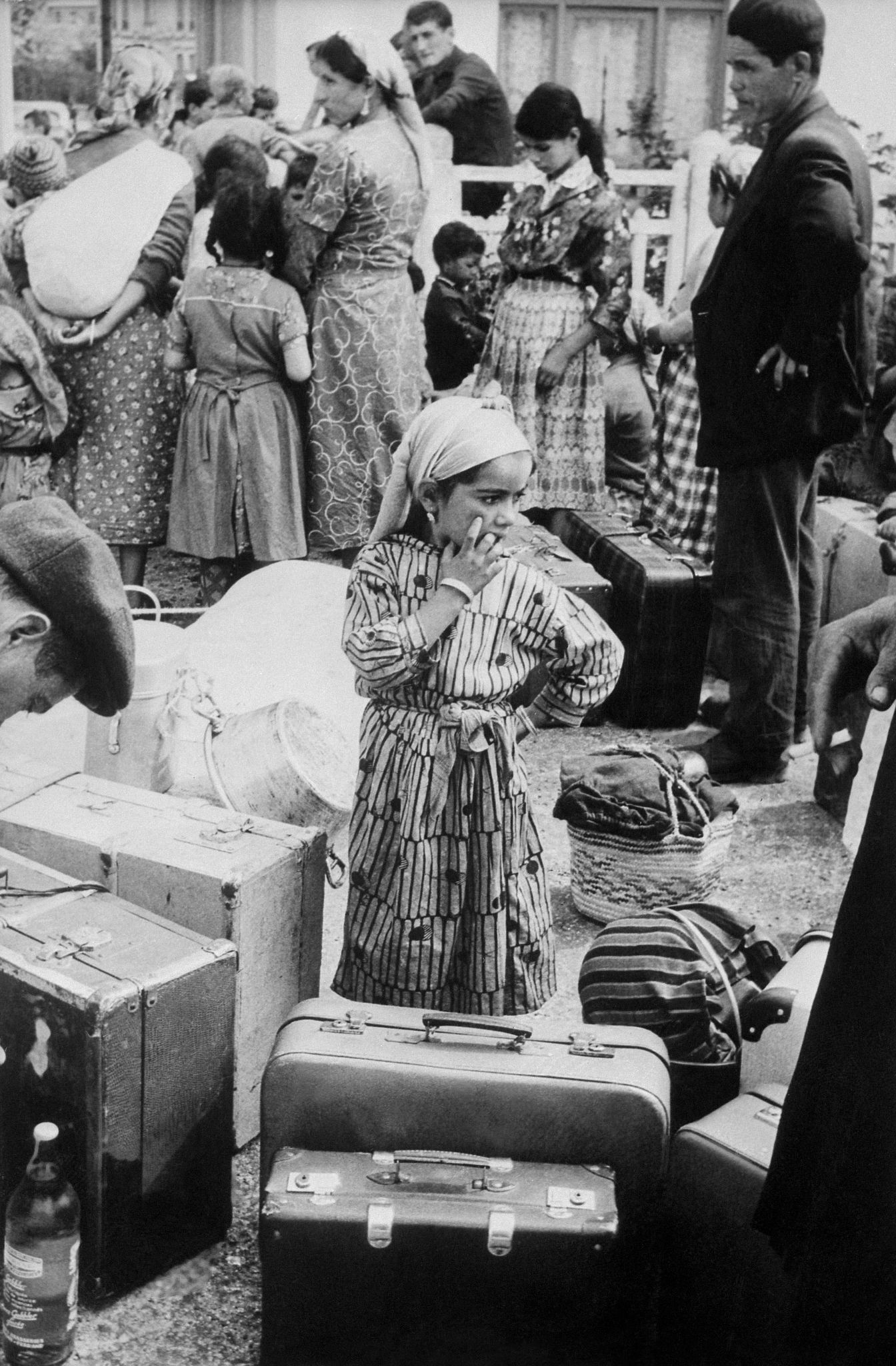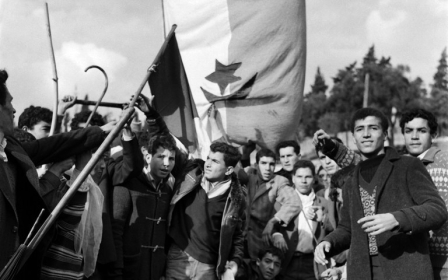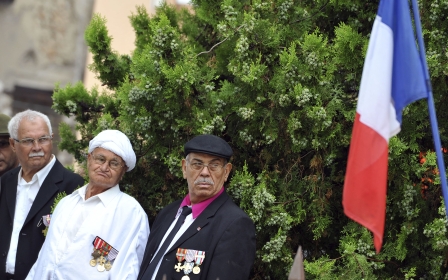Who are the Harkis? The Algerians who fought against independence
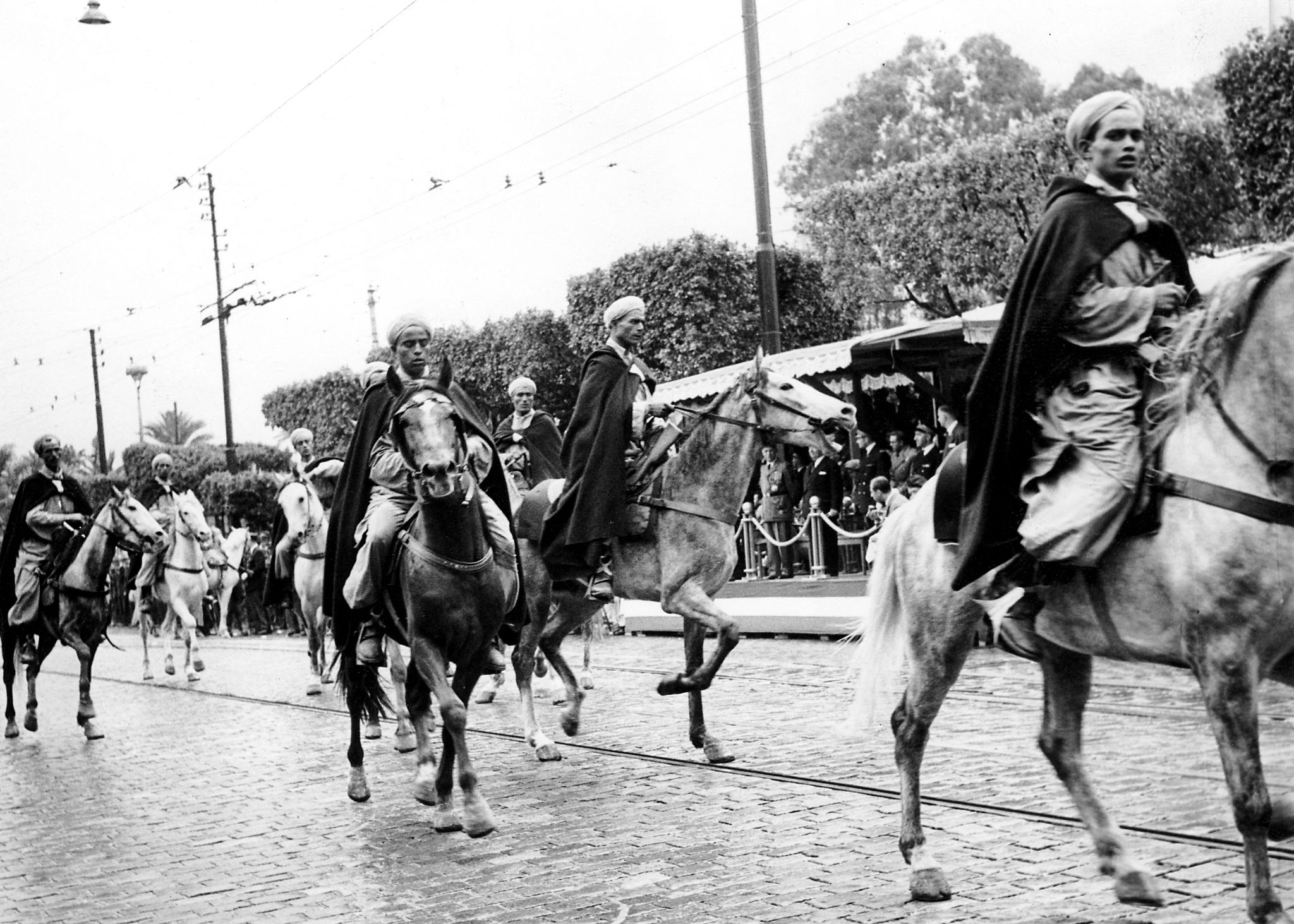
The term "Harki" is not widely known in the Anglosphere, but in France and North Africa it is a word loaded with controversy.
From the Arabic word Harka, meaning movement, it is used to describe Algerian Muslims who remained loyal to France during Algeria’s fight for independence, as well as their descendants who today still reside in both France and Algeria.
Stay informed with MEE's newsletters
Sign up to get the latest alerts, insights and analysis, starting with Turkey Unpacked
Among Algerians, the label has pejorative connotations with those who aligned with France during the independence struggle seen as traitors. Among the French elite, the word is a reminder of the country’s indifference towards non-Europeans who fought to preserve its empire.
While French settlers in Algeria, known as pied-noirs, were evacuated after the Evian Accords, which preceded the French withdrawal, Harkis were deliberately left behind among a population who saw them as a treacherous fifth column.
Those who did leave Algeria, with the help of sympathetic French officers, were forced into internment camps.
While successive French leaders have sought to draw a line under the episode and have praised the role Harkis played in the occupation of Algeria, many within the community do not believe the state has done enough to atone for its behaviour.
That sentiment was in evidence during a September address by French President Emmanuel Macron at the Elysee in front of an audience of Harkis, expressing his determination to do more for the community.
During the speech, which came days before National Harki Day, he was heckled by the tearful daughter of a Harki, who condemned the state’s “empty promises”.
France has honoured the role played by Harkis during the conflict in Algeria every year since 2003 on 25 September, but Macron has conceded France "failed in its duty towards the Harkis, their wives, and their children.”
Accordingly, the French leader has promised to draft a law recognising the state’s responsibility for the welfare of Harkis with provisions for "reparations" for their treatment over the decades.
But the Harkis say they have received little other than platitudes up until now.
"We hope that you will be the one to end 60 years of a certain hypocrisy by which the abandoning of the Harkis is recognised in speeches, but not in the law," read a statement put out in the run-up to Macron’s address in September.
On the other end of the spectrum and demonstrating the continued anger towards Harkis in Algeria to this day, the National Liberation Front (FLN), which launched the war of independence in 1954, denounced Macron for “honouring traitors” and trying to create “civilised colonialism” which “cannot erase the scale of barbarism that left millions of martyrs and victims of colonial oppression.”
The Algerian independence struggle claimed between 500,000 and 1.5 million Algerian lives, the latter number according to the FLN.
Here Middle East Eye takes a look at the history of the Harki community, from its formations during the Algerian War of Independence, to its struggle for recognition in contemporary France.
The price of choosing France
Shortly after the FLN announced the start of its independence campaign on 1 November 1954, French officers began arming loyalist Muslims and tasking them with protecting civil infrastructure amid increasing chaos in rural Algeria, with the first units taking form in 1955.
The Harkis were distinguished from Muslim elites who had opted for French nationality before 1954 by virtue of their class background and their lack of integration into the French armed forces.
As such, a typical recruit was likely to be uneducated and from a peasant background, and more interested in financial stability and security than the debates surrounding independence.
They served the role of auxiliaries, acting as scouts, general infantry and as manual labourers.
Before 1961, when Harkis were granted legal status, many had been independently recruited by French commanders on short-term contracts, under vague employment conditions with no guarantee of future benefits.
At the signing of the Evian Accords in March 1962, two months before independence was declared on 5 July, a total of 58,000 out of an estimated 260,000 pro-French Algerians had served the French in some military or bureaucratic capacity.
As the war neared its end, France began to demobilise thousands of Algerian auxiliary units to recoup weapons and supplies. Harkis were then presented with three choices: they could be enlisted into the French army at a low rank and stationed in Europe without their families; return to civilian life with a bonus based on time served; or consigned to non-combatant roles.
Those who went with the second option did so with the hopes of returning to their villages and their old lives, but their decision to fight alongside France did not go unnoticed.
Contrary to popular belief that all Harkis who remained in Algeria were massacred, according to historian Dr Arthur Asseraf: “This was not the case though there was a great deal of violence.”
Estimates on the numbers of Harkis killed in Algeria range from 75,000 to 150,000, with the majority of the violent reprisals coming from civilians seeking revenge for murdered or tortured family members.
The FLN and its armed wing the National Liberation Army (ALN) for its part, initially treated the Harkis with sympathy and offered them a pardon if they joined the ALN, stating that they had been “tricked by the enemy”.
But in the tense climate that followed the war, personal vendettas took precedence and people were often falsely accused of having betrayed their country, finding their names on blacklists compiled to locate Harkis.
Harkis who were ostracised and fled to France with their families were stigmatised because of the shame associated with their actions and many could not return home due to the difficulties they would face from their compatriots.
An example of the enduring stigma associated with being a Harki came in 2000 when then-President Abdelaziz Bouteflika sparked outrage during a visit to Paris by comparing Harkis to Nazi collaborators and ruled out their return to Algeria despite acknowledging the poor conditions under which they were living in France.
Bouteflika altered his position in 2005 by admitting to the “errors with regard to the Harkis’ families and relations”.
Suffering from high levels of illiteracy and social alienation in both Algeria and France, the Harkis have not produced a large corpus of literature directly detailing their experiences. In France, they were a largely unacknowledged by-product of the country's failed attempt to incorporate Algeria, while in their homeland, the stigma of "treason" meant there were few avenues for social advancement.
Said Ferdi’s memoir in 1981 was one of the first published accounts by a Harki and initiated a surge in secondary Harki literature, such as those by the daughters of Harkis; Dalila Kerchouche and Fatima Besnaci-Lancou, who sought to shine a light on the Harki experience for the benefit of the French public.
A useful political card
Once they left Algeria, over 42,000 Harkis passed through internment camps in southern France between September 1962 and December 1964.
“They were discouraged from coming and there had not been much planning to host them,” Asseraf explains.
“The [camps] were meant to be temporary but sometimes lasted years. They were often rehoused in very rural, remote forest villages, so as to be far away from cities and to avoid disturbances with local inhabitants and Algerian immigrants, where living conditions were extremely poor.”
France feared the incoming influx of 85,000 mainly poor Muslims and pieds-noirs (European settlers) from Algeria would alter France’s demographic and bolster the far-right.
In early 1962, French minister for Algerian affairs, Louis Joxe, told the Council of Ministers how “it was necessary to fight an infiltration, which under charitable pretext would have the effect of our welcoming undesirable elements”.
According to Asseraf, attitudes towards Harkis depended on people’s political affiliations.
“Supporters of French Algeria on the right were sympathetic to them, those on the left hostile, the majority probably indifferent and unwilling to take responsibility for their fate.”
Around half a million Harkis and their descendants live in France today and include high-profile figures like Interior Minister Gerald Darmanin, whose grandfather Moussa was a Harki. Several governments on the left and right have also appointed former Harkis as ministers.
That is in stark contrast to the situation for Harkis in Algeria, where a law passed in 1999 excluding those deemed not to have a “patriotic attitude” during the war of independence from certain jobs.
Since 1974, Harkis have protested their plight with hunger strikes and demonstrations. In August 2001, a coalition of 50 Harki groups attempted to sue the French state for having committed “a crime against humanity”.
A law was passed in February 2005, granting an allowance of around 400 euros a month ($462) for "Harkis, their orphans and repatriates of European origin" and in 2018, a €4om aid package was created to help Harki families. The same year, the state was ordered by the country’s highest court to compensate the son of a Harki for damages to his health from incarceration in the camps.
Focus on the Harki situation in France is generally strongest in the run-up to elections and with hundreds of thousands of Harkis and their descendants living in France, the group constitutes a significant voter bloc and have in the past been courted by the likes of Macron and former President Nicolas Sarkozy.
Normalised in popular culture
Both in Algeria and among minority groups in France, the word Harki is often used as a pejorative term against North Africans seen as overly sympathetic to the French. For example, in Algeria, former education minister Nouria Benghabrit was branded a Harki along with her father and grandfather, Kaddour Benghabrit, the first rector of the Grand Central Mosque of Paris, for being awarded the Legion of Honour.
The insult has also been normalised in French rap and artists will often include the word in lyrics irrespective of whether they are North African. In a release this year, popular artist Booba used the term in his song VVV and the rapper Rohff referred to French-Algerian artist Rim’K, whose father was in the Algerian resistance, as a Harki during a personal feud.
The term is also thrown at footballers of Algerian origin who choose to play for France. In 2001, Zinedine Zidane had to fend off death threats and accusations his father was a Harki after playing in a friendly football match between Algeria and France for the first time since Algeria’s independence.
“I am proud that my father is Algerian,” Zidane said after the match. “The only important thing I have to say is that my father never fought against his country.”
Similarly, Real Betis player Nabil Fekir was criticised in 2015 and called a Harki for choosing to play for the French football team over Algeria despite showing initial interest in the Desert Foxes.
But the Algerian national football team has allowed sons of Harkis to represent the country: Abdelmadjid Bourebbou, who played in the 1980s, confirmed after he retired that he had been open about being the son of a Harki - a position he distanced himself from by stating he would have joined the resistance had he been old enough at the time.
This article is available in French on Middle East Eye French edition.
Middle East Eye delivers independent and unrivalled coverage and analysis of the Middle East, North Africa and beyond. To learn more about republishing this content and the associated fees, please fill out this form. More about MEE can be found here.



